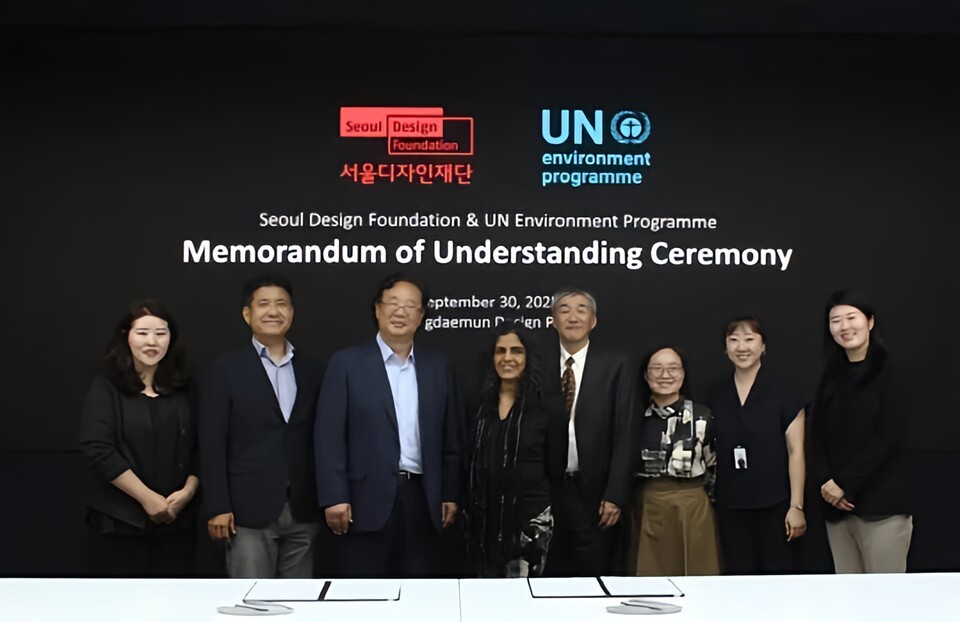The Seoul Design Foundation, in collaboration with the United Nations Environment Programme (UNEP), is presenting a direction for sustainable design. The foundation announced that it signed a memorandum of understanding with UNEP at Dongdaemun Design Plaza (DDP) on September 30th.
UNEP, established in 1973, is a UN subsidiary that has been leading the conservation, protection, and promotion of nature and resources globally, playing a pivotal role in international environmental preservation. Its headquarters are in Nairobi, Kenya, and the Korea Committee was founded in 1996.
At the signing ceremony, key figures, including Sheila Aggarwal-Khan, Director of UNEP’s Industry and Economy Division, and Takehiro Nakamura, Director of UNEP’s International Environmental Technology Centre (IETC), were present. The agreement will last for three years and includes joint responses to major environmental agendas, such as design-driven transitions for a circular economy, capacity building and innovation support, policy dialogs and pilot projects, zero waste, and waste management.
The two organizations plan to promote education programs and research and jointly carry out pilot projects to embed sustainability within design practices.
Sheila Aggarwal-Khan, Director of UNEP’s Industry and Economy Division, stated, “Design for a circular economy plays a crucial role in addressing climate change, biodiversity loss, and pollution issues.” She added, “Sustainable design is a practical solution that can drive economic growth while reducing resource consumption.”
The background to this collaboration lies in the achievements of the ‘Seoul Design Award’ organized by the Seoul Design Foundation. Over the past six years, the foundation has discovered global designers and shared innovative cases under the theme of ‘Creative Solutions for Sustainable Living.’

This year’s ‘Seoul Design Award 2025’ aligned with the UN Sustainable Development Goals (SDGs) and covered four areas: Health and Peace, Equal Opportunity (Universal Design), Energy and Environment (Upcycle and Recycle), and City and Community. A record 941 projects from 74 countries were submitted.
The jury commented, “The Seoul Design Award is not just a design competition; it is a practical design platform to solve social and environmental issues.” Andrea Cancellato, Director of the ADI Design Museum, said, “The creativity of participating designers and the citizens-centered approach were impressive.”
‘Seoul Design Award 2025’ will take place on October 24th at DDP. Global design leaders will share the latest trends and unveil the TOP10 projects. The TOP10 includes various designs aimed at solving common human challenges, such as climate crisis response, urban issues, and social inclusion.
Notable entries include a modular solar charging hub, a project upcycling Iranian women’s hijabs into stadium seating, 3D concrete structures for desert environments, emergency cradles for vulnerable groups, rechargeable portable sanitizers, chicken feather waste upcycling, indigenous cultural space regeneration projects, eco-friendly pavilions, resource-circular space designs, and nature-friendly lighting designs.
Citizens’ online voting and evaluations by the international jury will determine the final winner by October 22nd.
Kanghee Cha, CEO of the Seoul Design Foundation, stated, “Seoul has grown into a global hub to discuss and implement common human challenges through design,” and added, “Through the collaboration with UNEP, we will present a new vision of sustainable design to the world.”